
Employees Stop Going Above And Beyond At Work And Join “Quiet Quitting” Trend, But Bosses Are Not Happy
Quiet quitting! You may have heard your colleagues whispering about it by the water cooler or seen HR reading up on it. And if you haven’t, don’t worry about it: it’s a pretty fresh trend and you’re about to find out why the idea has gone viral around the globe. In short, more and more people are realizing that their jobs are completely meaningless. Suffering from burnout and not really seeing the point of it all, instead, they’re choosing to do the bare minimum at work.
That means less overtime (if any!), actually resting during your breaks, and putting yourself first. It’s very similar to the Chinese trend of ‘tang ping’ (aka ‘lying flat’). In other words, though you’re not literally quitting your job, you’re quitting the idea of reaching higher, going above and beyond, and exceeding expectations. Because, in many people’s opinions, it’s just not worth it. You do enough to get by; you clock out and go live your life. No more hustle culture, no working late, no stressing out over vague projects and possible promotions. You do what you’re paid to do.
Bored Panda has collected the most powerful reactions to quiet quitting from all over social media and the internet to share with you, including from TikTok, Twitter, Reddit, (that sometimes weird place known as) LinkedIn, and beyond. Scroll down, have a read, and let us know what you think of QQ, and the fiery debate surrounding it, dear Pandas.
Bored Panda wanted to get to grips with quiet quitting and what it’s all about a bit better, so we reached out to workplace expert Lynn Taylor, the author of ‘Tame Your Terrible Office Tyrant: How to Manage Childish Boss Behavior and Thrive in Your Job’ and the head of the fashion brand ‘Behind the Buckle.’ She told us that the trend is one of “the most interesting developments in workplace trends,” and that it’s been “bubbling up over time” for a few reasons.
There’s a new work trend that more and more employees are becoming aware of. It’s called quiet quitting, and it’s started a heated debate online
Image credits: Akshay Gupta (not the actual photo)
“For one, during the pandemic people of all generations, but particularly Gen Z, realized there is more to life than a job. Remote work allowed people to see more appealing aspects of life and smell the roses, with less of a rigid schedule. Paradoxically, the pandemic also blurred the lines between work and personal life enough where work entrenched itself in the home—and therefore consumed more of one’s waking hours,” she said.
“The combination of more personal flexibility… along with a dark blanket of working 24/7 was a recipe for corporate pushback. All in all, the pandemic illustrated to many that the ‘life’ part of ‘work-life balance’ was much more meaningful,” the expert told Bored Panda. Scroll down to read our full interview with Lynn and how different people interpret the trend and why finding meaning in your work is so important.
People have been discussing the trend on TikTok and social media, helping spread the idea even more
Image credits: zaidleppelin
Here’s what one TikToker had to say about quiet quitting
Image credits: zaidleppelin
According to workplace expert Lynn, there’s another factor that led to the rise of quiet quitting as a trend. “Younger generations have watched their overachieving parents allow work stress to consume them. They don’t understand the notion that working endlessly for them has been a badge of honor,” she told Bored Panda.
“In the broader sense, this workplace trend is understandable because, for so many decades, hustle was king. Baby boomers have been iconic of this belief system. It’s not surprising that a priority shift is occurring in reaction to the excesses of work. That said, it’s a matter of gaining control and boundaries,” the expert said.
Lynn noted that quiet quitting can be interpreted in several ways. “If the trend were renamed, ‘The New Boundary Setting,’ it would sound much more palatable. If you’re now able to set boundaries that protect your mental and physical health, then quiet quitting just means being prudent. It’s a helpful way to operate if you tend to be an overachiever, too. The mentality of giving less could actually bring you to a healthier level of work ethic; more within the bell curve,” she explained to Bored Panda.
“At the other extreme, is a segment of quiet quitters who are standing up to anything that requires extra effort. And sometimes you have to put in extra time to get the job done, not to mention get ahead. If being a quiet quitter means you have pent-up anger towards business and society putting too much emphasis on work, and you rigidly refuse to work beyond the call, that can hurt your career. That’s especially true in a recessionary period, where unemployment is higher,” she noted that there different ways how people approach quiet quitting.
“The final factor is that the job market has been relatively strong in the last few years. That fueled the Great Resignation and less employee loyalty. Workers are standing their ground in general. Leaner times could change all that.”
Workplace expert Lynn pointed out that when employees can’t find purpose or meaning in their jobs, productivity and the economy both suffer. “It has more serious ramifications than seen at face value. Workers need to feel they’re contributing to a larger purpose, especially today. Otherwise, it’s human nature to do the minimum required. Employee engagement begins with your job search. Now more than ever, workers need to find jobs that resonate with them,” she said.
“Not enough attention has been placed on the impact your boss and coworkers have on engagement. As I suggest in my book, ‘Tame Your Terrible Office Tyrant: How to Manage Childish Boss Behavior and Thrive in Your Job,’ employees don’t leave jobs, they leave people. The people with whom you work must inspire you. But you are responsible to find the right opportunity… and to keep building on it.”
According to Lynn, more money doesn’t always mean more satisfaction at work. “While the Great Resignation has been an opportunity for greener pastures and employee pushback, ironically more money has not always equated to more engagement or contentment at work. There has been significant evidence that among those who joined this contingent, there have been regrets. Hence the importance of focusing on the people factor when seeking happiness in your job.”
Some people took issue with the term itself and thought that it’s just literally doing the job you’re paid to do and setting healthy boundaries
Image credits: andorianspice
Image credits: pati_gallardo
Image credits: themiasandrist
Image credits: JortsTheCat
Image credits: saImineo
Image credits: sesmith
Image credits: Yan Krukov (not the actual photo)
Meanwhile, Bored Panda also wanted to get the workplace expert’s opinion about how employees can deal with the fact their work lives might feel mundane and as though they’re on repeat.
“When work lives are mundane, the primary person who can change that is the employee. If every day seems like the movie Groundhog Day, then clearly it’s time to do something different. That might mean deploying skill sets that can help the company but have not been tapped or even changing jobs. It’s helpful to volunteer for projects that you would enjoy and let your manager know of the range of skills you possess,” Lynn suggested how workers can tackle this problem.
“Finally, people go to work for more than a paycheck. Ideally, you should feel like you’re learning from your boss and they’re helping you feel challenged. Employees can also learn from colleagues. A deeper connection than zoom calls and staff meetings is required. Work life will seem more satisfying when relationships with colleagues are productive and enjoyable.”
Meanwhile, others suggested changing the name of the trend to something that fits the spirit of the idea better
Image credits: Matt Margolis
Image credits: Tim Slade
Image credits: Amber Naslund
Of course, quiet quitting doesn’t automatically mean that no jobs are meaningful or that you can’t be happy in whatever profession you’re in. However, it does point out that after more than two and a half years of the Covid-19 pandemic and the meaninglessness of many tasks and meetings, employees are mentally clocking out. They do not see the point of stressing out over jobs that don’t give them a sense of Purpose with a capital ‘P.’
When you’re overworked, unengaged, feel you like have no autonomy and can’t decide where your career might go, how can you expect to feel energized and ambitious about your position? The fact is that many workers simply don’t. And while purpose is generally a two-way street, the tasks themselves have to be meaningful: you can’t expect the employees to shoulder the entire burden of finding meaning where there’s none to begin with.
The idea of quiet quitting neatly ties in with anthropologist David Graeber’s playful insight that many modern jobs are complete and utter cow poo (we’re rephrasing a bit because social media doesn’t like ‘naughty’ words; thanks, Zuckerburg). According to him, there are millions of people, from consultants, telemarketers, and corporate lawyers to clerical workers, administrators, and service personnel, whose jobs are useless. And they know it!
The people doing these jobs can’t justify their existence but pretend that there’s some reason for them to exist. Though technology has advanced to the point where we could theoretically be free of the anachronism that is the 40-hour workweek, things have taken a different turn: useless positions have sprung up. Jobs that aren’t really needed and that leave the employees feeling hollow. Work isn’t just about keeping a roof over your head and putting food on the table. It can be spiritually and emotionally fulfilling.
Some social media users took the opportunity to point out the flaws in capitalism and hustle culture
Image credits: urbanbohemian
Image credits: seandehey
Image credits: thevapent
Image credits: Athena_Grayson
Image credits: JimboskiGames
Image credits: susan_pattee
Image credits: SRylof
Image credits: TheGeoffey
Image credits: mollydevon
Financial expert Sam Dogen, the founder of Financial Samurai and the author of ‘Buy This, Not That,’ previously stressed to Bored Panda that it’s vital to take time off if you’re feeling burned out.
“Take sick days and mentally recharge. Don’t just think being ill is just a physical thing. There are plenty of mental illnesses. They are just not as visible. There is no better time than right now to take sick days due to the pandemic and the greater awareness of mental health issues. There is simply no shame in healing the mind!” he told us during an interview, earlier.
According to the financial expert, people like to brag about how much they work because they want validation, approval, respect. “Working long after your colleagues are gone means nobody will see your hard work. Hence, you need to tell people about it because the results often take time to manifest. The irony is, if you have great results, there’s no need to tell anybody how hard you work,” he said.
Sam was candid: it’s not enough to work hard; you have to work smart as well. And he said that if you have ambitions to get ahead in your career, you should do both while you still have lots of energy when you’re young. (Obviously, this doesn’t apply to anyone who doesn’t have any desire to have a corner office in a super fancy international company.)
“In your 20s and 30s you need to work BOTH smarter AND harder, especially if you are of average intelligence. The world is a brutally competitive place with some of the smartest people also working the hardest. So working long hours while you’re still young and learning is a matter of practicality,” the expert said that the competition is brutal.
“You can’t expect to go straight to the corner office without putting in your dues. At the same time, you can’t expect to outperform your peers simply through hard work. You have to be strategic by building a strong network of relationships internally and externally (clients) who will pull to get you promoted and help you get paid at your next job.”
The quiet quitting trend has had a wide range of responses online. Some professionals are very critical of QQ because they see it as a form of entitlement. However, others believe that QQ is simple realism: you do the amount of work you’re paid to do. Why work extra for free, when you don’t see any clear opportunities for growth in the future?
As a response to quiet quitting, some people thought it was vital to speak about ‘quiet firing’ as well
Image credits: randy_miller
However, on LinkedIn, quite a few professionals were critical of quiet quitting as a whole
Image credits: Arianna Huffington
Image credits: Karen Michael
Image credits: Chris J Reed
Image credits: Alexandra Panousis
Some people argued that not everyone can afford to embrace the QQ trend and do the bare minimum. Marginalized groups, in particular, can’t afford to lose their jobs
Image credits: Gorki De Los Santos
@_thehrqueen Can quietly quitting destroy your career? ✨ #hrqueen#quietquitting#iquit#corporateamerica#mentorforu#youngprofessionals#hrlife#hrtok#careertips#careeradvice#careeradvicedaily#leadershipdevelopment#ReTokforNature♬ Level Up – Kwe the Artist
What do you think about the quiet quitting trend, Pandas? Share your thoughts in the comments!
Image credits: Andrea Piacquadio (not the actual photo)
What do you think of quiet quitting, Pandas? How do you find meaning in your work? Have you embraced QQ already in one form or another? How do you maintain a healthy work/life balance? Do you think that QQ is a smart approach or do you find it questionable? Do you think that the trend is something new or is it just a rephrasing of healthy boundaries? Share your thoughts with us in the comments!
279Kviews
Share on Facebook30 years ago when I entered the workforce - going "above & beyond" was rewarded with raises, bonuses, promotions, and new opportunities. That was how I moved from answering the phones to managing a team. More recently - extra effort reaps no significant reward. Employers ask for 110%, but don't compensate for it. The incentive to hustle is no longer there... I don't blame people for "just doing the job".
Same. That is how I got promoted as well, and annual bonuses, and job perks (like a tickets to football game or concert). Very few companies still do this and it sucks for the workers. I don't blame anyone for clocking out at the end of the day and turning off their phone.
Load More Replies...Quiet quitting sounds like a dumb made up guilt trip phrase. No doubt invited by the CEO’s who would rather make up stupid terms then give you a raise. Cause God forbid people get paid a living wage and have a life outside of work. 🙄 The phrase is dumb and misleading. Nobody wants to work 60 hrs anymore and have no time for a life. It’s not a good time. Been there done that and won’t ever again.
Good. I am glad people are setting boundaries. Hopefully gone are the days when companies stop making people do the jobs of 2-3 people without compensation.
I agree. When I hired a painter to paint my house, I did not also expect him to mow my lawn and clean my gutters. When I paid a plumber to fix my sink, I didn't demand he also regrout the shower and clean my oven. Corporations are getting a well deserved reality check. You don't deserve to get more than you pay for.
Load More Replies...30 years ago when I entered the workforce - going "above & beyond" was rewarded with raises, bonuses, promotions, and new opportunities. That was how I moved from answering the phones to managing a team. More recently - extra effort reaps no significant reward. Employers ask for 110%, but don't compensate for it. The incentive to hustle is no longer there... I don't blame people for "just doing the job".
Same. That is how I got promoted as well, and annual bonuses, and job perks (like a tickets to football game or concert). Very few companies still do this and it sucks for the workers. I don't blame anyone for clocking out at the end of the day and turning off their phone.
Load More Replies...Quiet quitting sounds like a dumb made up guilt trip phrase. No doubt invited by the CEO’s who would rather make up stupid terms then give you a raise. Cause God forbid people get paid a living wage and have a life outside of work. 🙄 The phrase is dumb and misleading. Nobody wants to work 60 hrs anymore and have no time for a life. It’s not a good time. Been there done that and won’t ever again.
Good. I am glad people are setting boundaries. Hopefully gone are the days when companies stop making people do the jobs of 2-3 people without compensation.
I agree. When I hired a painter to paint my house, I did not also expect him to mow my lawn and clean my gutters. When I paid a plumber to fix my sink, I didn't demand he also regrout the shower and clean my oven. Corporations are getting a well deserved reality check. You don't deserve to get more than you pay for.
Load More Replies...
 Dark Mode
Dark Mode 

 No fees, cancel anytime
No fees, cancel anytime 
















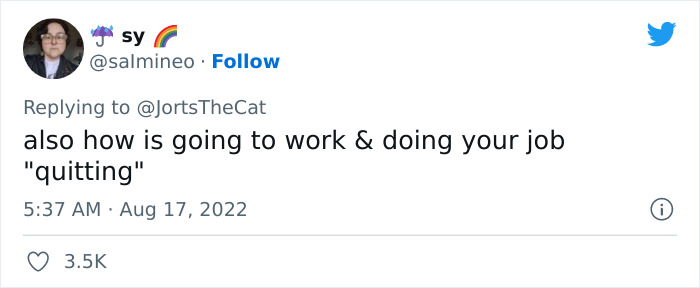








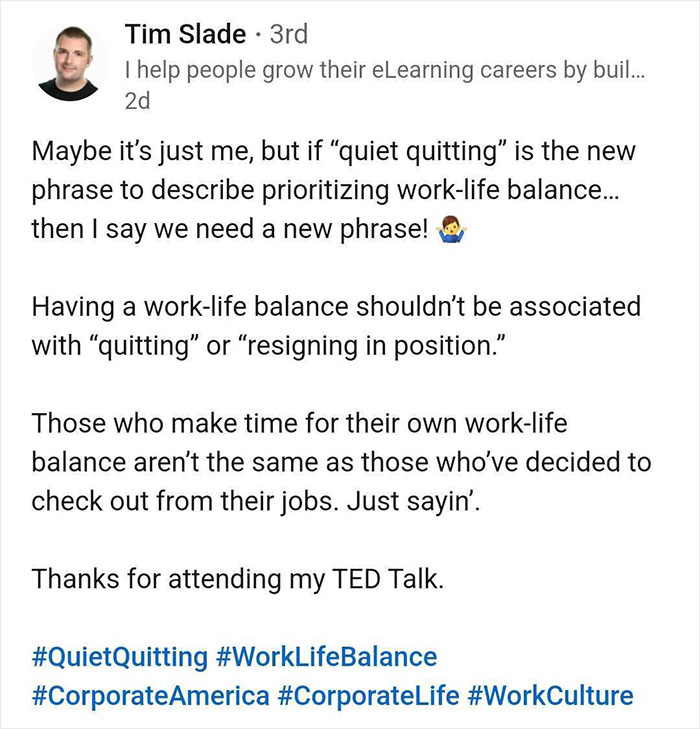
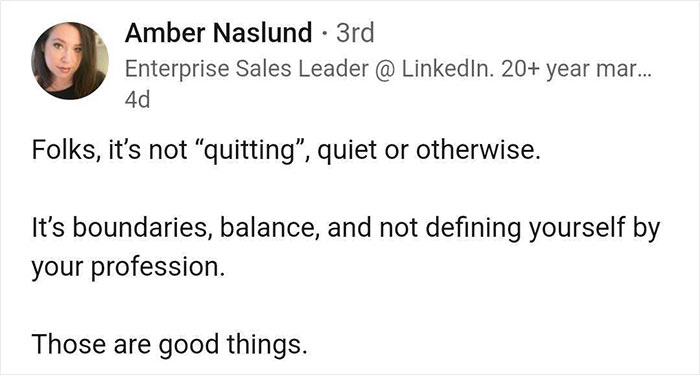

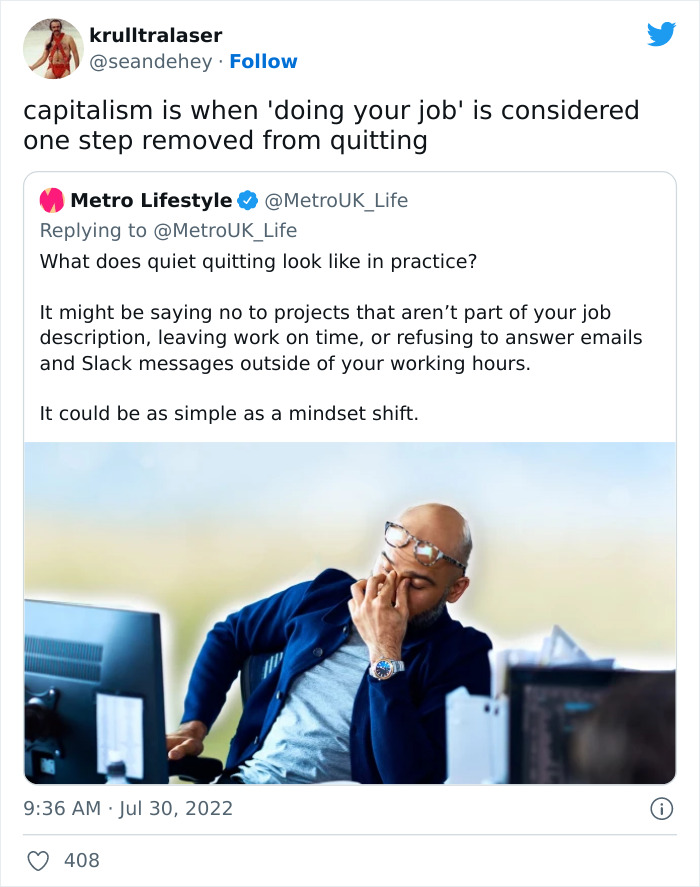
















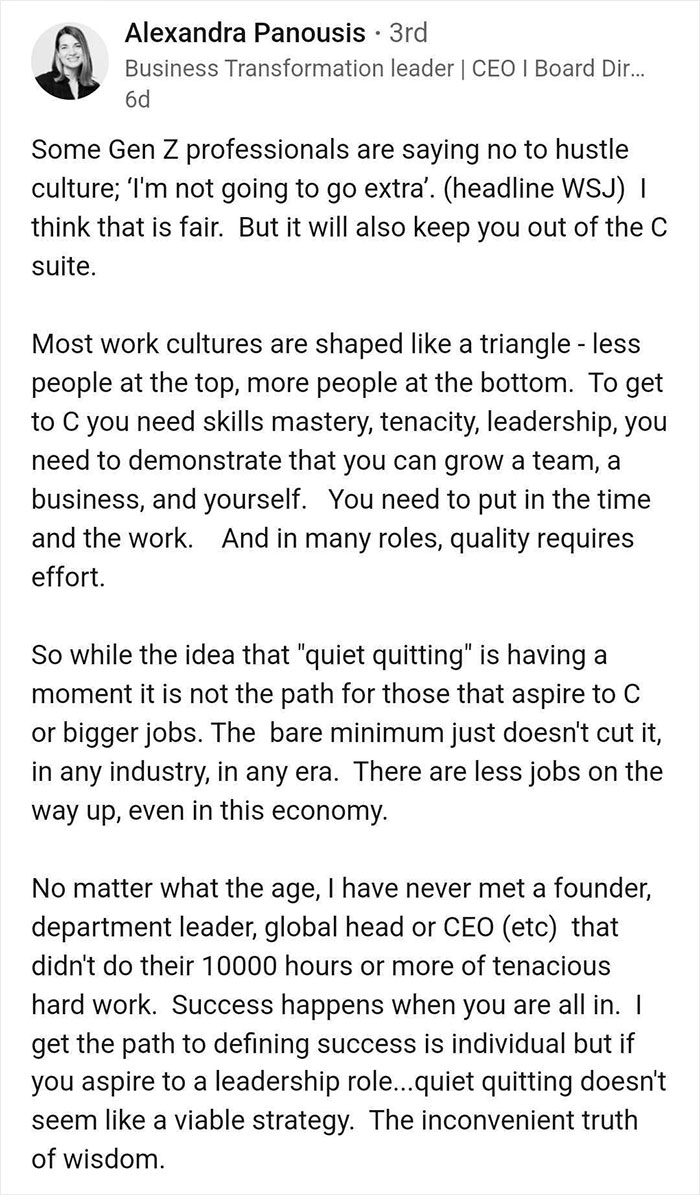
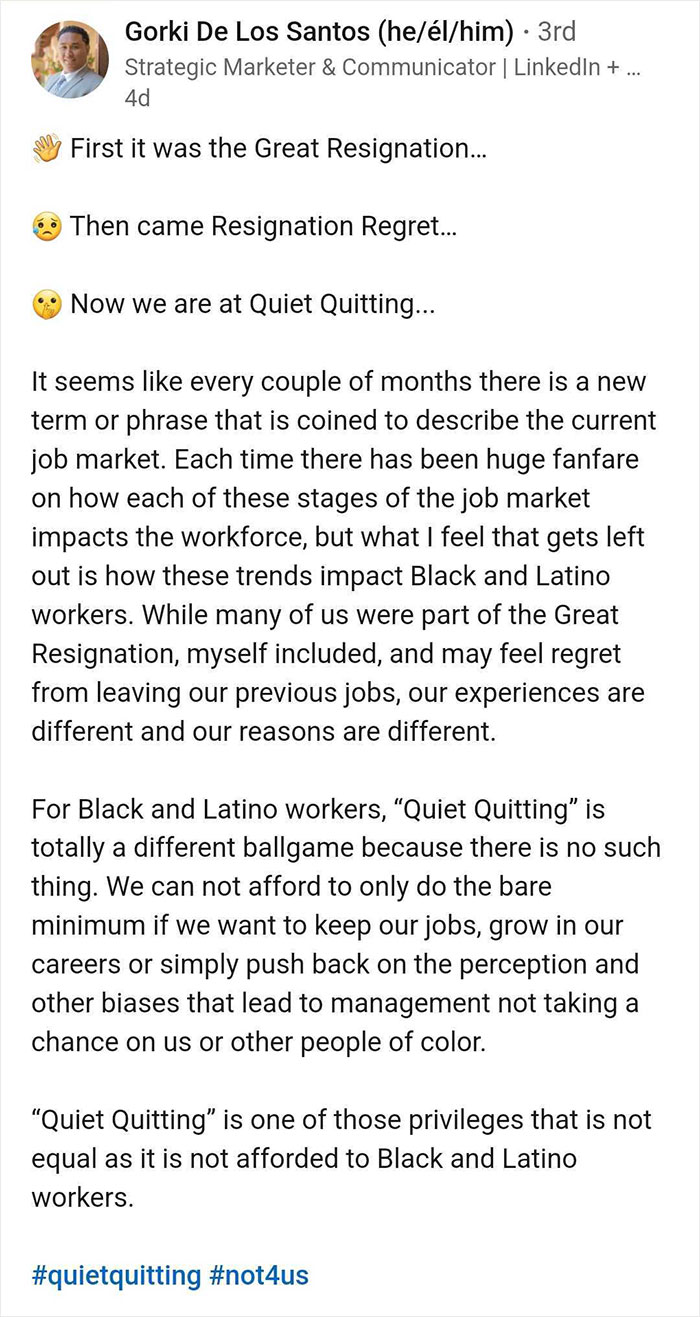














































76
78